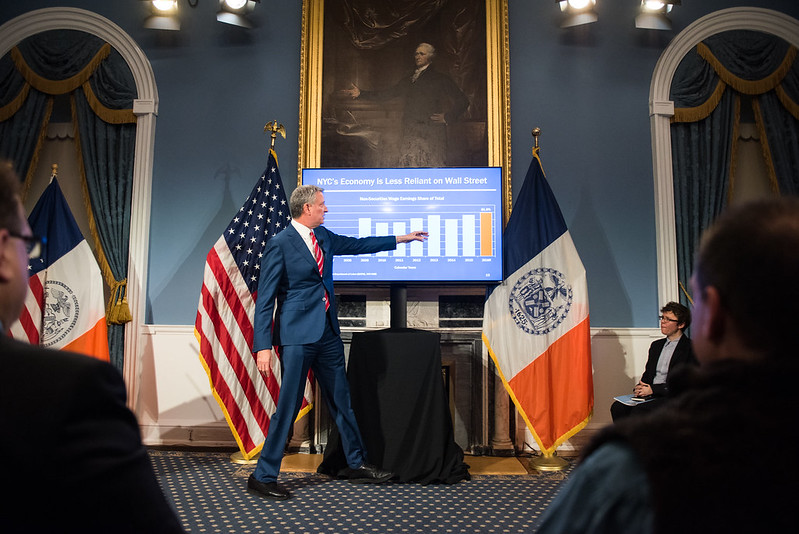
(photo: Edwin J. Torres/ Mayoral Photo Office)
Despite a full-court press from cities and states across the country, Congress left for August recess without passing joint legislation to provide them with federal financial assistance. This aid is desperately needed by localities, both red and blue, that have suffered dramatic revenue losses due to the shutdown of much of their economies during the pandemic. There is still hope that some amount of aid will eventually be forthcoming, but not in time or in sufficient amount to address the dire needs of New York City and State.
While the current fiscal year budget for the city is technically balanced, it includes some big risks, such as large police overtime reductions that are often attempted but never achieved and a $1 billion target for labor savings with no details or signs that any real discussion is taking place. The projected deficit for next fiscal year is $4.2 billion. So the likelihood is that the combined two-year deficit is close to $6 billion, maybe more.
But Mayor de Blasio has delayed taking action to address the gap until October, hoping that federal funding would come through in the meantime. As that prospect looks more and more unlikely, he has taken to warning that 22,000 layoffs will be necessary unless the city is given permission by the state to borrow money to cover the shortfall; to make the threat more real and compelling to legislators, notices of the number and savings value of possible layoffs by agency are scheduled to be released on August 31 and there have been leaked reports of dire consequences such as layoffs of hundreds of EMTs and thousands of teachers.
The mayor bristles at comparisons of the current situation to the 1970s when the city relied so heavily on financing its expenditures that it got to the point when no one would loan it any more money. Yes, the reason for the revenue shortfall now is different. Then, it was a problem of spending persistently exceeding resources; now it is a dramatic and sudden loss of revenue caused by an unanticipated health calamity. But the result is the same: the city is not generating enough tax revenue (or state and federal aid) to pay for all its costs. And while we can and should be bullish about the city’s resiliency, there is reason to believe that its economic recovery will take several years at best; and the size and nature of the economy may be quite different than what it was before everything changed in March.
Borrowing for the next two years will not solve the problem, but only exacerbate it, because if there is insufficient revenue to cover expenses, more borrowing will be required and so on. Taxpayers of tomorrow will be paying hundreds of millions of dollars of debt service for bad decisions of today. It took until 2008 for the debt incurred to save New York City from bankruptcy in the ‘70s to be finally retired. The mayor has said that to keep debt service payments manageable he would cut capital spending (the only valid purpose for financing), a decision that could curtail high-priority infrastructure investments that are important to the city’s revitalization.
Unlike in the ‘70s, the state is not in a position to backstop the city by stepping in to take over its debt as it did then by creating the Municipal Assistance Corporation. Indeed, New York State is in even worse financial straits than the city, with skyrocketing Medicaid and unemployment insurance costs, not to mention the MTA on the brink of disaster.
What is needed are thoughtful, strategic spending reductions, not the across-the-board layoffs the mayor is threatening. The Citizens Budget Commission and other experts have come up with a number of valid suggestions including reductions in the cost of fringe benefits and productivity improvements. Public employee unions can be especially helpful in agreeing to compensation and work-rule and staffing changes so that all savings do not result in reductions to services to residents. No ideas should be shelved out of the belief that union opposition would be insurmountable; now is the time for doing what conventional wisdom would say is impossible. A serious, good faith effort by the de Blasio administration, the City Council, and public employee unions, working together to use a scalpel, not a hatchet, can significantly reduce costs and minimize the amount, if any, of borrowing required.
Let us be clear: our opposition to borrowing to pay operating expenses is not driven by a small government ideology. Rather it arises from a commitment to strong, secure, well-managed government and a desire to avoid even worse austerity measures that will come if we don’t make politically difficult but necessary decisions now.
Both the City and State Comptrollers, as members of the New York State Financial Control Board and as fiscal watchdogs, have an obligation to state clearly and unequivocally that borrowing our way out of the current crisis with no conditions or requirements for spending discipline (i.e. a reinstatement of the oversight and control powers of the Control Board) is not viable and should not be permitted. If they and legislative leaders Speaker Carl Heastie and Majority Leader Andrea Stewart-Cousins cave to pressure from public employee unions and others who don’t want to take responsibility for managing through the crisis, they will be complicit in kicking the can down the road and will bear the responsibility for the even more draconian actions that will need to be taken under the next mayor.
***
Carol Kellermann was president of Citizens Budget Commission from 2008 through 2018. Norman Steisel was a First Deputy Mayor of New York City, Sanitation Commissioner, and First Deputy Budget Director, all between 1974 and 1994.
***
Have an op-ed idea or submission for Gotham Gazette? Email This email address is being protected from spambots. You need JavaScript enabled to view it.




